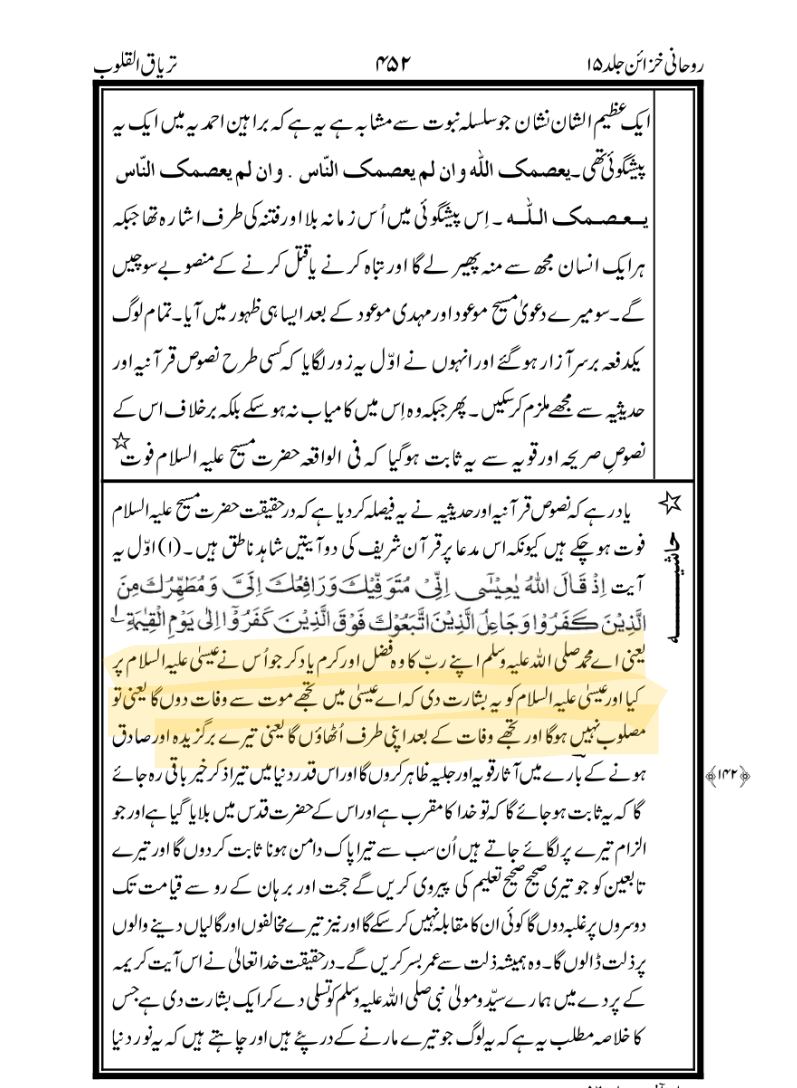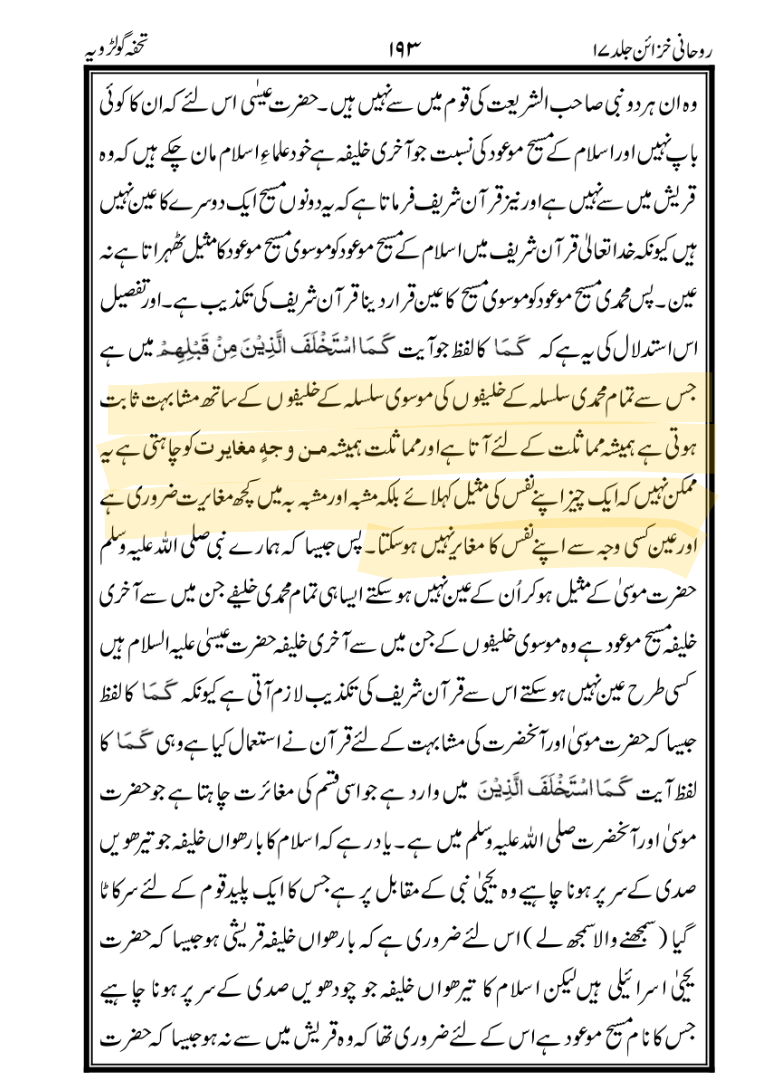Objection
The Qadiani claim that in Sahih Bukhari, there is a hadith in which it is mentioned that on the Day of Judgment, when some people from the Prophet’s (صلى الله عليه وسلم) Ummah are brought forward to be thrown into Hell, the Prophet (صلى الله عليه وسلم) will say, “These are my companions.” Then it will be replied, “You do not know, they added innovations to your Shari’ah after you.” Upon this, the Prophet (صلى الله عليه وسلم) will say:
وَ كُنۡتُ عَلَیۡهِمۡ شَہِیۡدًا مَّا دُمۡتُ فِیۡہِمۡ ۚ فَلَمَّا تَوَفَّیۡتَنِیۡ کُنۡتَ اَنۡتَ الرَّقِیۡبَ عَلَیۡہِمۡ
This is used to prove that the meaning of “Tawaf” is death. So if “Tawaf” means death for the Prophet (صلى الله عليه وسلم), why is it not the same for Messiah (علیہ السلام)?
Narration:
عَنْ ابْنِ عَبَّاسٍ رَضِيَ اللَّهُ عَنْهُمَا ، قَالَ : خَطَبَ رَسُولُ اللَّهِ صَلَّى اللَّهُ عَلَيْهِ وَسَلَّمَ ، فَقَالَ : يَا أَيُّهَا النَّاسُ إِنَّكُمْ مَحْشُورُونَ إِلَى اللَّهِ حُفَاةً عُرَاةً غُرْلًا ، ثُمَّ قَالَ : كَمَا بَدَأْنَا أَوَّلَ خَلْقٍ نُعِيدُهُ وَعْدًا عَلَيْنَا إِنَّا كُنَّا فَاعِلِينَ سورة الأنبیاء آیت 104 إِلَى آخِرِ الْآيَةِ ، ثُمَّ قَالَ : أَلَا وَإِنَّ أَوَّلَ الْخَلَائِقِ يُكْسَى يَوْمَ الْقِيَامَةِ إِبْرَاهِيمُ ، أَلَا وَإِنَّهُ يُجَاءُ بِرِجَالٍ مِنْ أُمَّتِي ، فَيُؤْخَذُ بِهِمْ ذَاتَ الشِّمَالِ ، فَأَقُولُ : يَا رَبِّ أُصحَابِي ، فَيُقَالُ : إِنَّكَ لَا تَدْرِي مَا أَحْدَثُوا بَعْدَكَ ، فَأَقُولُ : كَمَا قَالَ الْعَبْدُ الصَّالِحُ ، وَكُنْتُ عَلَيْهِمْ شَهِيدًا مَا دُمْتُ فِيهِمْ فَلَمَّا تَوَفَّيْتَنِي كُنْتَ أَنْتَ الرَّقِيبَ عَلَيْهِمْ وَأَنْتَ عَلَى كُلِّ شَيْءٍ شَهِيدٌ سورة المائدة آیت 117 ، فَيُقَالُ : إِنَّ هَؤُلَاءِ لَمْ يَزَالُوا مُرْتَدِّينَ عَلَى أَعْقَابِهِمْ مُنْذُ فَارَقْتَهُمْ .
(Sahih al-Bukhari, Hadith 4625)
The Messenger of Allah (صلى الله عليه وسلم) delivered a sermon and said, “O people, you will be gathered to Allah barefoot, naked, and uncircumcised.” Then he recited the verse, “Just as We began the first creation, We shall return it; that is a promise We have undertaken. Indeed, We will do it.” (Surah Al-Anbiya, Ayah 104) and the verses that follow. Then he said, “Indeed, on the Day of Judgment, the first of creation to be clothed will be Ibrahim. And some men from my Ummah will be brought and taken to the left side (of Hell), and I will say, ‘O my Lord, these are my companions.’ It will be said, ‘You do not know what they innovated after you.’ I will say, ‘As the righteous servant said, I was a witness over them as long as I was among them. But when You took me, You were the Observer over them, and You are, over all things, a Witness.'” (Surah Al-Ma’idah, Ayah 117). Then it will be said, ‘These people kept on reverting to disbelief after you left them.’
Response
Firstly, consider this rule:
When the same word is used for two different individuals, the meaning of the word can vary depending on the context of the individuals.
Now, let’s look at some proofs.
تَعۡلَمُ مَا فِیۡ نَفۡسِیۡ وَ لَاۤ اَعۡلَمُ مَا فِیۡ نَفۡسِکَ ؕ (المائدہ:116)
“You know what is in my soul, and I do not know what is in your soul.”
In this verse, the word “Nafs” is used for both Messiah (علیہ السلام) and Allah (سُبْحَانَهُ وَ تَعَالَى), but the meaning of “Nafs” differs according to the context. Similarly, Mirza Qadiani uses the word “Tawaf” for Messiah (علیہ السلام) and interprets it as “to die” or “death.” However, when referring to himself, he interprets “Tawaf” as “to receive full blessings.”
Tiryāq al-Qulūb, Khazā’in, Vol. 15, Page 452

Furthermore, Allah says about the Prophet (صلى الله عليه وسلم):
مُحَمَّدٌ رَّسُوۡلُ اللّٰہِ ؕ وَ الَّذِیۡنَ مَعَہٗۤ اَشِدَّآءُ عَلَی الۡكُفَّارِ رُحَمَآءُ بَیۡنَہُمۡ (الفتح :29)
Muhammad (صلى الله عليه وسلم) is the Messenger of Allah, and those who are with him are severe against the disbelievers and merciful among themselves.
But Mirza Qadiani claims that God revealed to him: “Muhammad is the Messenger of Allah, and those who are with him are severe against the disbelievers and merciful among themselves.” He claims that his name was also Muhammad, and he was a messenger.
Now, Qadianis should answer: Is the meaning of the word “Messenger” the same for Mirza Qadiani as it is for the Prophet (صلى الله عليه وسلم)? For the Prophet (صلى الله عليه وسلم), the term “Messenger” means the Lawgiver, the complete one, the best of all Prophets, and the Seal of the Prophets. Can this same definition be applied to Mirza Qadiani? The answer is clear: it cannot be. Therefore, it is proven that when the same word is used for two persons, its meaning can differ depending on the context.
Tuhfah Golardawiyah, Khazā’in, Vol. 17, Page 193

As mentioned in the hadith, the phrase “Kama” indicates that the Prophet (صلى الله عليه وسلم) is not saying exactly what the Messiah (علیہ السلام) said, which signifies a difference between their statements. “Kama” is used for simile, meaning the two are not identical, but there is a similarity. Hence, this shows that the Prophet (صلى الله عليه وسلم) is differentiating between his statement and that of Messiah (علیہ السلام).
In conclusion, the word “Tawaf” in the context of Prophet (صلى الله عليه وسلم) means death (due to the context of the hadith), whereas for Messiah (علیہ السلام), the “Tawaf” refers to his ascension to the heavens (رفع السماء). There is no evidence to support that Messiah (علیہ السلام) experienced death in this context.
Summary
- When the same word is used for two different individuals, its meaning may differ.
- The Prophet (صلى الله عليه وسلم) and Messiah (علیہ السلام) used different contexts for the word “Tawaf.”
- The hadith shows that there is a clear distinction between the Prophet’s (صلى الله عليه وسلم) statement and Messiah’s (علیہ السلام) statement using the word “Tawaf.”